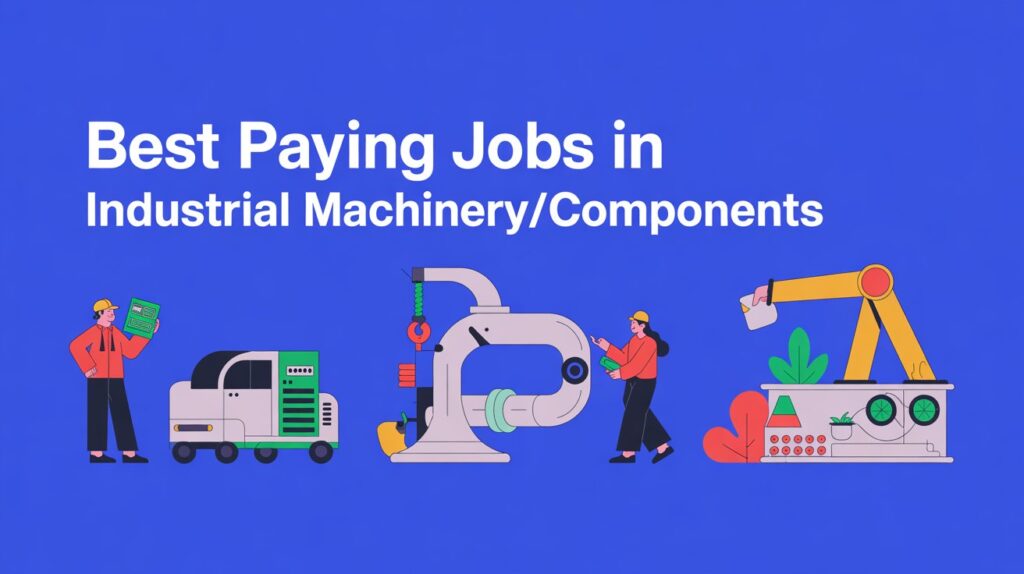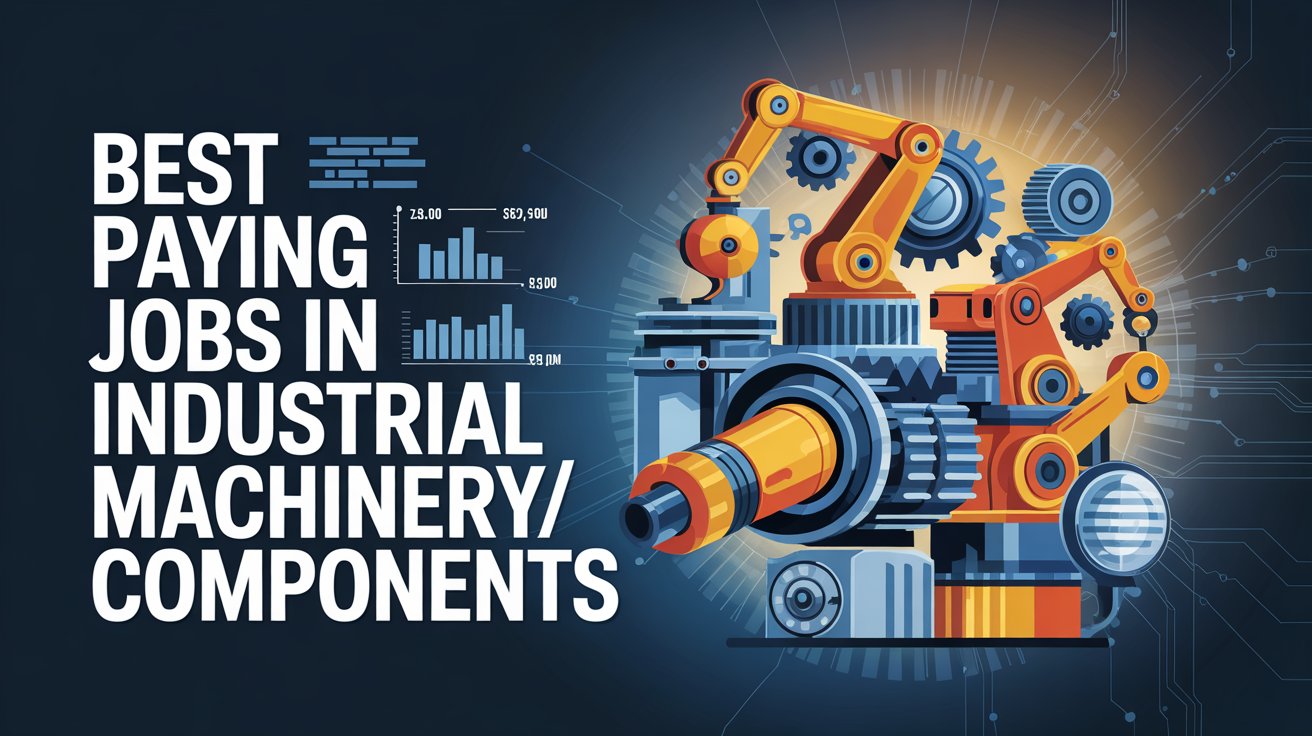Best paying jobs in industrial machinery/components: Do you want to work at a job that pays well and gives you room to advance? A career in industrial machinery or components might be a good option for you.
There are plenty of opportunities for upward mobility in these industries and some of the best-paying jobs. It’s your best bet if you want a job in industrial machinery/components with plenty of opportunities to progress up the ladder.
It is not only the most prominent industrial machinery manufacturer in the country that contribute significantly to GDP growth and employment rates but also exports a large number of machine tools and industrial machinery to the global market, making it one of the largest exporters of industrial machinery in the world.
Manufacturing of Industrial Machinery in the USA
Traditionally, the manufacturing sector in the USA has been among the most productive in the world – producing more than 18.2% of the world’s total goods yearly, with industrial machinery manufacturing constituting the backbone of its manufacturing activities.
It also provides essential gear and highly sophisticated technology to many other manufacturing and service industries, making industrial machinery manufacturing a vast and competitive sector today. Automation technologies and industrial process controls enable end-users to maximize the productivity of their industrial machinery.
Also, Read: Top 6 Important Financial Planning Tips for Women
The Significance of the Industrial Machinery/Components in USA
In addition to making goods and services for a country, the machinery industry encompasses various activities. Among the world’s most dynamic and vital manufacturing sectors is that of the United States. Increasingly, multinational corporations with facilities in multiple countries are the norm in today’s modern economy. Machinery and components businesses require a global strategy to succeed globally.
The machinery industry has many different career paths to choose from. We will examine these three jobs below.
- Management of senior sales
- Engineer in product development
- Manager of a manufacturing plant
What are Types of Industrial Machinery/Components are Used?
Industrial machinery consists of various components, each serving a specific purpose. Several types of components are commonly used, and they are listed below:
The Valves
Controlling the flow of fluids is done by valves. Pipes and plumbing systems commonly contain them.
Motors
Electrical energy is converted into mechanical motion by electric motors. Conveyor belts, fans, and pumps commonly use them.
Also, Read: 10 Passive Income Ideas To Build Wealth In 2025
The Gearbox
Through gears, it is possible to transfer motion between two shafts that are not aligned. In differential gears and transmissions, they are commonly found.
The Bearings
Rotating components are supported and reduced in friction by bearings. A motor, fan, or pump commonly contains them.
The Sensors
Pressure, temperature, and flow are all physical quantities that can be detected and measured by sensors. Automated processes and process controls are common uses for them.
What is the Future of Industrial Machinery/Components?
Technology continues to advance, which has led to changes in the design and manufacture of industrial machinery components. Increasingly, 3D printing is replacing traditional manufacturing methods with more efficient ones. Industrial machinery component manufacturers are rethinking their strategies due to this shift.
What are the Eligibility Criteria for Applying in Industrial Machinery/Components?
As part of the manufacturing industry, industrial machinery components play a significant role. The company produces components for factory and industrial machines. The job market in this sector is competitive, so understanding the eligibility criteria for the positions you are interested in is essential.
Best-Paying Jobs in Industrial Machinery/Components?

Many industries are served by the machinery industry, which designs, develops, manufactures, markets, and sells machinery. Engines, compressors, pumps, and machinery are included in this sector. There can be a lot of money to be made working in the machinery industry. Here are some of the best-paying jobs in industrial machinery/components:
- Engineer in automation
- Engineer for locomotives
- Operator of a crane
- Mechanical Engineering
- An industrial designer
Engineer in automation
In automation engineering, everything is automatic, which means that things will work independently without human intervention. An Automation Engineer earns $98,566 annually in the United States due to growing industry demand for technology. Automation is considered an evergreen field. Therefore, there are many job opportunities in the field.
Engineer for locomotives
It is not their job to work on subways – they work on heavy rail trains to transport passengers or goods and inspect different trains during emergencies. Locomotive Engineers earn $97,131 annually in the United States, interpreting train orders, monitoring speed meters, and conducting break examination tests.
Operator of a crane
The crane industry is one of the most in-demand industries, with crane operators growing nearly three times faster than other occupations. Being an operator will allow you to explore your full potential and experience the thrill of the job. A Crane Operator in the United States earns $96,490 annually if you’re ready to advance your career.
Mechanical Engineering
Mechanical engineers design, produce, operate, analyze, and maintain machinery works. They may also work in manufacturing plants or analyze industrial equipment. An Engineering Mechanical Engineer earns $85,162 annually in the United States and must possess a strong understanding of mechanics, dynamics, thermodynamics, material science, and electricity.
An industrial designer
Industrial designers design all products from computers to laptops and everything else you use. Moreover, an Industrial Designer in the United States earns $77,000 annually and needs to be curious and creative.
How Does an Industrial Machinery Components Job Work?
Here’s How Does an Industrial Machinery Components Job Work.
- Learn how to operate and maintain the equipment by studying the technical guides.
- If there is a concern about equipment or machinery, remove it.
- Replacing damaged parts or repairing them.
- Make sure the machine runs without problems by testing it and running the first batches.
- Identifying minor problems with simple tests is possible by performing simple diagnostics.
- If the equipment is malfunctioning, determine whether major repairs are required.
- Machinery and equipment must be adjusted and calibrated to meet the manufacturer’s specifications.
- Equipment should be cleaned and lubricated correctly, or machines may malfunction.
- It is necessary to transfer machines and equipment.
Do Industrial Machinery/Components Jobs Offer Good Benefits?
Many industrial machinery and components companies offer competitive benefits packages that include health insurance, retirement plans, bonuses, paid time off, and education reimbursement programs. Some high-level positions may also include performance-based bonuses or stock options.
What Is The Average Salary In Industrial Machinery/Components?
Salaries vary widely depending on the job role, location, and experience level. However, salaries for roles like Mechanical Engineers or Manufacturing Managers often range from $60,000 to $120,000 annually, with more senior positions earning even higher salaries.
FAQs
What Qualifications Are Required For High-Paying Jobs In Industrial Machinery/Components?
Most high-paying roles require a degree in Mechanical Engineering, Industrial Engineering, Manufacturing Engineering, or related fields. Additionally, certifications such as Certified Maintenance Manager (CMM), Project Management Professional (PMP), or Six Sigma certifications can boost earning potential. Hands-on experience is also critical.
How Can I Advance My Career In The Industrial Machinery/Components Field?
To advance in this field, gaining experience with advanced machinery, developing leadership skills, and obtaining relevant certifications can be helpful. Pursuing roles that offer experience in managing teams, large-scale projects, or overseeing production lines can open the door to higher-paying opportunities.
Are There Opportunities For Job Growth In The Industrial Machinery/Components Industry?
Yes, there is significant job growth in the industry, especially in areas related to automation, robotics, and sustainable energy solutions. As industries continue to advance technologically, the demand for skilled professionals in machinery design, maintenance, and operations will increase.
Is Experience More Important Than Education For High-Paying Jobs In This Field?
Both education and experience are valuable. A relevant degree provides a strong foundation, but hands-on experience, particularly with advanced industrial machinery and systems, is essential for securing high-paying roles. Certifications can also help boost your qualifications.
What Industries Offer The Best-Paying Jobs In Industrial Machinery/Components?
The best-paying jobs are often found in aerospace, automotive manufacturing, oil and gas, and energy production. These industries require highly specialized machinery and skilled workers to ensure equipment operates efficiently and safely.
How Does Location Affect Salary In The Industrial Machinery/Components Field?
Yes, location can significantly influence salary. Areas with high demand for industrial machinery experts, such as near major manufacturing hubs, oil fields, or technology centers, tend to offer higher wages. Regions with a high cost of living also generally pay more to offset living expenses.
Conclusion
Components can vary based on the industry and region in industrial machinery, considering the wide variety of jobs available. However, the number of jobs available in this field is estimated to be hundreds of thousands worldwide. In the coming years, more companies are expected to adopt automation and robotics technologies in their manufacturing processes.
